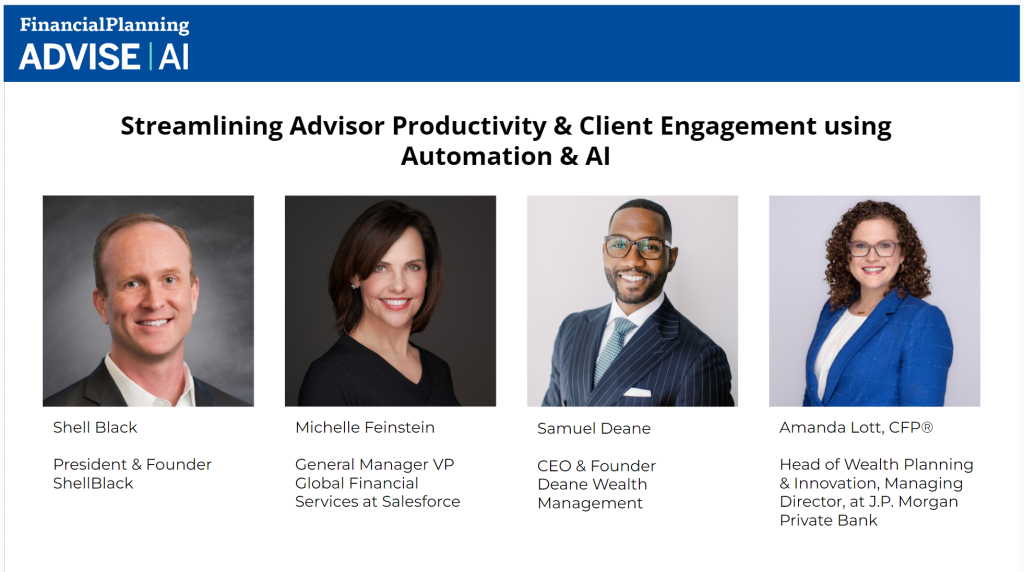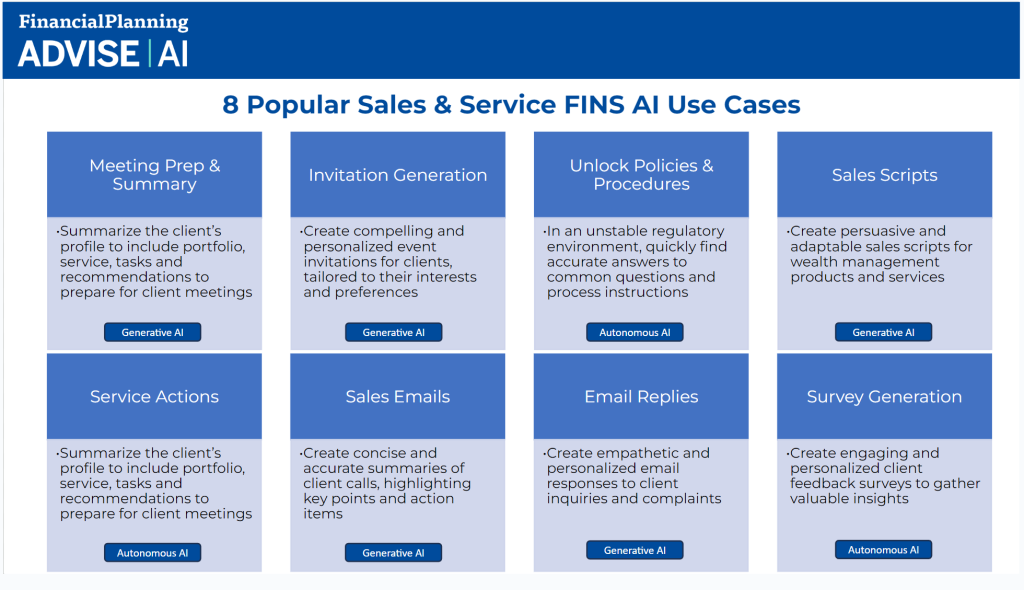At the inaugural Financial Planning Advise AI conference in Las Vegas, ShellBlack joined an impressive slate of industry experts to unpack the impact of artificial intelligence (AI) for financial advisors. No matter the size of the financial firm, AI has the potential to help advisors nurture client relationships and grow the business more efficiently.
President & Founder Shell Black represented our firm as both a panelist and moderator for the session titled “Streamlining Advisor Productivity & Client Engagement Using Automation & AI.” Other panelists included Salesforce General Manager VP Global Financial Services Michelle Feinstein, Deane Wealth Management CEO & Founder Samuel Deane, and J.P. Morgan Head of Wealth Planning & Innovation and Managing Director Amanda Lott. Together, they discussed how automation and AI can boost productivity, enhance client relationships, and allow financial advisors to focus more on high-value activities.

The session offered a unique blend of perspectives, contrasting the experiences of single advisors utilizing AI with those of large enterprise wealth firms. Panelists shared the tools currently in use and highlighted the benefits, potential pitfalls, and key considerations for firms of all sizes as they begin their AI journey. The panel addressed essential compliance issues and adoption strategies, and they shared practical use cases of AI in the financial advisory space. Examples included using AI for meeting preparation and client summaries, accessing policies and procedures quickly, and automating follow-up summary emails for clients. By the end of the session, attendees had a comprehensive understanding of how AI can streamline client engagement and enhance productivity across the board.

This panel was one of many sessions focused on AI and automation in the financial sector. Other insights, best practices, tools, and takeaways for advisors are summarized below.
Kitces on AI’s Role in Financial Planning
Michael Kitces, a prominent voice in financial planning and the publisher of the popular Financial Advisor Technology Map, emphasizes the importance of keeping AI’s role in perspective. Kitces argues for AI as a tool to expedite tasks, not to replace the advisor’s expertise in interpreting the client’s financial circumstances or crafting personalized advice.
Kitces notes, however, that current AI capabilities fall short in one important area. Many systems rely on prompt engineering rather than direct, intuitive interfaces. Advisors would benefit more from an AI-driven user interface that offers seamless workflows and executes commands without extensive prompting. Kitces believes AI tools that handle meeting notes, action items, and compliance documentation are the most likely to be widely adopted, especially in time-intensive operations like meeting preparation and post-meeting follow-ups.
The Era of AI Copilots: A Paradigm Shift
As AI becomes deeply integrated into business, financial advisors and registered investment advisors (RIAs) are presented with an evolving landscape. Charles Morris, chief data scientist of Financial Services at Microsoft, emphasizes that this current wave of AI isn’t designed to replace professionals but rather to function as a “copilot.” This new breed of AI will assist and enhance advisors’ roles by amplifying capabilities across financial planning, reasoning, and context while automating mundane tasks. Unlike past AI models, today’s generative AI enables true collaboration, offering intuitive tools that support advisors by making applications more intelligent and responsive.
A major shift here is the evolution toward “team copilots,” which will transform how groups collaborate in real time. AI can now take on more dynamic responsibilities, such as handling meeting agendas, creating follow-up tasks, and even acting as project managers, which can be invaluable for advisors managing large client bases.
Data: The Foundation of AI-Powered Advisory Services
AI is only as powerful as the data that feeds it. Quality data underpins effective AI solutions, ensuring they deliver accurate, actionable insights. The key is blending data from disparate sources into a unified, queryable system. Some tools can assist with this, but the cost may be prohibitive for smaller firms. The hope is that the cost will continue to decrease as advancements occur, making it more affordable for everyone.
Enhancing Marketing and Lead Generation with AI
AI has become an essential tool for generating leads and creating targeted client content. Tools like ChatGPT, Opus.AI, and Perplexity allow advisors to develop unique, compliant content quickly. These tools expedite the content creation process, which helps advisors turn a simple idea or FAQ into a fully realized blog, social post, or video snippet.
For example:
- Perplexity and ChatGPT: Advisors can prompt these tools with FAQs or real client concerns to develop insightful, high-quality content that aligns with client needs and addresses their common questions.
However, advisors must remain vigilant with AI content. “Hallucinations” in AI responses are common, and without careful fact-checking, AI could generate inaccurate information. Prompt engineering has become a skill of its own, requiring advisors to learn how to carefully tailor their questions to receive useful, accurate results.
The Compliance Challenge: Ensuring AI-Advised Content Meets Regulatory Standards
The advisory industry is highly regulated, and AI adoption raises new considerations around compliance. All AI-generated content still requires human review to meet compliance standards, and vigilance is especially critical given the potential for AI to “hallucinate” and produce inaccurate information.
Advisors are encouraged to establish a compliance protocol for AI-generated content, which might include tools that spot potential noncompliant elements. Although this can streamline review, human oversight remains essential.
AI in Prospecting: Uncovering Hidden Opportunities
Advisors often face the challenge of finding and qualifying prospects. AI can help streamline this process by identifying warm leads and analyzing large datasets to uncover hidden connections, such as shared interests or mutual connections on social platforms.
By analyzing these patterns, advisors can identify clients who are most likely to engage and can focus their time on building meaningful relationships rather than cold calling. This capability is especially valuable for smaller firms, which can leverage AI to compete effectively with larger players.
Best Practices for AI in Financial Advisory
While AI offers vast potential, financial advisors must adopt best practices to ensure they are using AI effectively and ethically:
- Establish a Brand Voice with AI: Advisors should train AI to replicate their unique style and tone. By uploading existing content and asking AI to emulate their voice, advisors can achieve a consistent brand experience across channels.
- Use Multiple AI Tools Strategically: No single AI tool excels at every task. Advisors may find value in using a combination of platforms.
- Double-Check Everything: Advisors should never assume AI-generated content is accurate. Fact-checking and validating sources are critical, especially with industry-specific data that could impact clients’ financial decisions.
- Prioritize Data Security: With AI integrating deeply into data management, advisors must ensure that sensitive information is protected. Data lakes and compliance features should strip out personally identifiable information (PII) before sharing it.
Looking Ahead: A Balanced Approach to AI Integration
AI in the financial services sector has the potential to revolutionize how advisors operate, allowing them to be more efficient, compliant, and client-focused. By embracing AI as a copilot, advisors can enhance their capacity to handle larger client bases; focus on higher-value activities; and provide proactive, data-driven insights. AI isn’t a substitute for the human touch — yet its ability to help advisors serve clients with greater efficiency and insight can make every touchpoint more meaningful.
Contact ShellBlack to discover how Salesforce is harnessing AI to empower advisors with tools that streamline productivity and enhance client engagement.
Author Credit: Marnee Lott, Director of Marketing at ShellBlack